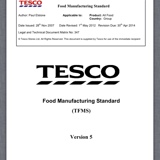Information
-
Document No.
-
Audit Title
-
Client / Site
-
Conducted on
-
Prepared by
-
Location
-
Personnel
34.1 - CORPORATE COMMITMENT TO ETHICAL TRADING (BASE)
-
Management must have knowledge of the Ethical Trading Initiative (ETI) Base Code and Tesco Ethical Code of Practise
-
The Site must comply with Tesco requirements for ethical trade audits (where deemed necessary)
-
Management must have knowledge of all applicable local labour laws
-
A written ethical trading policy statement must be in place which must be communicated to the workforce
-
Management must be aware of their ethical risk rating (available from Tesco Technical Manager)
-
The Site must be registered with SEDEX
-
The self assessment information must be completed and kept up to date
-
If rated as a High Ethical Risk, the site must have an ethical audit conducted by a Tesco recognised auditor prior to supply and every year
-
If rated as a Medium Ethical Risk, the Site must have an ethical audit within 6 months and then every 2 years
-
All non-compliances raised in an ethical audit must be resolved within the time frames outlined in the corrective action plan
-
WGLL - the policy makes reference to the ETI Base Code and is signed by the owner or director
-
WGLL - the policy is mentioned at induction, in site newsletters and displayed on staff notice boards
-
WGLL - Protector line posters are displayed in staff areas (UK based sites). <br>Site may have an equivalent process in place.
34.2 - ETI BASE CODE (BASE)
-
The Site must comply with the ETI base code
34.2.1 - ETI BASE CODE (BASE)
-
The site can demonstrate that employment is freely chosen
-
WGLL - jobs are openly advertised or open to all who meet the personal criteria
34.2.2 - ETI BASE CODE (BASE)
-
Workers are allowed freedom of association
-
WGLL - Union membership allowed and / or worker councils present
34.2.3 - ETI BASE CODE (BASE)
-
Working conditions are safe and hygienic
-
Designated persons (adequately trained) responsible for health and safety.
-
Health and safety - Risk assessments undertaken where appropriate
-
WGLL - qualified person used to assess safety risks
-
WGLL - safety committees meet and minutes kept
34.2.4 - ETI BASE CODE (BASE)
-
Worker welfare facilities adequate
-
WGLL - Changing rooms, toilets, eating areas and first aid facilities provided and well maintained
34.2.5 - ETI BASE CODE (BASE)
-
No child labour
-
WGLL - the age of all workers is known and there is a system in place to manage the work completed by under 18 year olds
34.2.6 - ETI BASE CODE (BASE)
-
Wages are enough to meet the basic needs and provide some discretionary income or comply with minimum wage legislation
-
WGLL - The site pays the minimum wage and overtime premiums
34.2.7 - ETI BASE CODE (BASE)
-
Working hours do not exceed 48 hours (unless employee has chosen to opt out)
-
WGLL - the site has a system to monitor working hours
34.2.8 - ETI BASE CODE (BASE)
-
The site operates an Equal Opportunities policy and does not discriminate on race, caste, age, gender, religion, or union membership etc.
34.2.9 - ETI BASE CODE (BASE)
-
Work is on the basis of a recognised employment relationship
-
WGLL - site has contracts of employment
34.2.10 - ETI BASE CODE (BASE)
-
No harsh our inhumane treatment of staff
-
WGLL - Site has a disciplinary, appeal and grievance procedure
34.3 - ETHICAL TRADING IN THE SUPPLY CHAIN (ASPIRATIONAL)
-
Suppliers have policies and procedures in place for managing ethical trading standards with their own suppliers
-
WGLL - a risk-based compliance programme for ethical trading standards, based on the ETI Base code, using competent and independent ethical auditors, and managed through the SEDEX website














